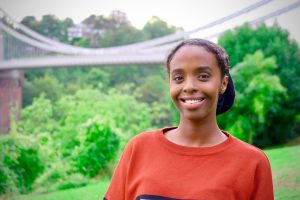
Junior doctor and activist, Asha Mohammed (MBChB 2019) graduated from the University in 2019. She’s since been given a Wonderful Woman Award and named as a Future Leader in recognition of her commitment to tackling gender based violence. We spoke to her about life as a doctor, her efforts to combat gender-based violence and her belief in in youth activism.
Why did you study medicine and how has your course shaped who you are?
I studied medicine because it is a versatile profession that is challenging, requires lifelong learning and good interpersonal skills. You’re always interacting with patients and colleagues from different teams and every day feels different. I like to think my passion was sparked from my interest in human biology and my desire to do a job that was fulfilling and one which would make a positive impact on society.
I love the mental challenges of the job and the breadth and depth of the subject. I am excited by the prospect that my learning and performance has a direct impact on the patients that I treat. I love the closeness that I get with not only my patients but also their families, and the impact that I can have on their lives.
You are now a junior doctor, what is the most rewarding aspect of your profession?
It’s really rewarding to be a part of someone’s life in their most vulnerable hours and to be able to help them get better.
It is also a privilege to be in a profession where someone trusts you with their health and personal wellbeing – whether that be medical, social or psychological. I don’t think that is something you would get in most jobs.
Working during the pandemic in my first year of graduation was something I will never forget. Being able to support the NHS during the Covid efforts and being part of a profession that was such a strong pillar in society made me realise the importance of the role I had studied for.
Can you tell me a little bit about your work with Integrate UK and why this charity matters?
I started my work with Integrate in my third year of medical school as a social media intern. I then went on to be a lead outreach worker where I delivered workshops on a variety of topics such as female genital mutilation (FGM), gender-based violence, honour-based violence, child sexual exploitation and grooming.
This was really important because it allowed us to not only educate young people about these difficult topics, but also educate frontline professionals so that the change could be made from the get-go.
These are topics that are not often spoken about but are very much prevalent in medicine. I think there is a lot more work to be done around these issues but it is so rewarding to see that there have been some small positive changes already.
During the fourth year of my studies, I was the lead organiser for the National End FGM conference held at the University. Seeing this project come to life and the impact it made, as well as the learning that was achieved, was the highlight of my role with Integrate. This charity is integral to helping young people in Bristol speak out about subjects that are important to them and it being youth led is what makes it even more special.
You were given a Wonderful Women Award by Bristol Women’s Voice. Can you tell me about the work this award was given in recognition of?
This award was given to me at the International Women’s Day Conference to recognise my work on gender-based violence. My work started in Bristol with Integrate UK and it’s important to discuss the role Bristol has played globally to tackle this issue.
Bristol has been at the forefront of the efforts to end FGM by 2030: a goal set out by the United Nations. Female genital mutilation has no place in the UK and the work of charities in Bristol has led to policy change and raised awareness of this harmful and illegal practice.
Following the successful campaign that was started by one of Integrate’s young people, FGM safeguarding became mandatory for teachers in 2015. There have been multiple conferences held in Bristol to raise awareness about FGM and plenty of marches. More recently the opening of the FGM clinic saw many charities across the UK working together with the NHS.
It’s been great to see the work of the young people in Bristol make meaningful change, with the support of their communities. Following Integrate’s work with the government, secondary school education on FGM became statutory in 2019 which was a big step forward.
What would be your advice be to young women who are studying medicine now?
Don’t let gender roles play into what speciality you want to go into.
Representation matters and we are seeing more and more female doctors in higher positions. These women are fighting the patriarchy and showing us you can have both a family and be a doctor, which was once not the ideology.
There are certain specialties in medicine, like surgery, that are male dominated. But it is inspiring to see that more women are entering these specialties. I hope to see more queens in these fields in the future.

What a wonderful story- – Dr Asha Mohammed will go far!!
What a fantastic role model you are Asha! Keep up your excellent work!!